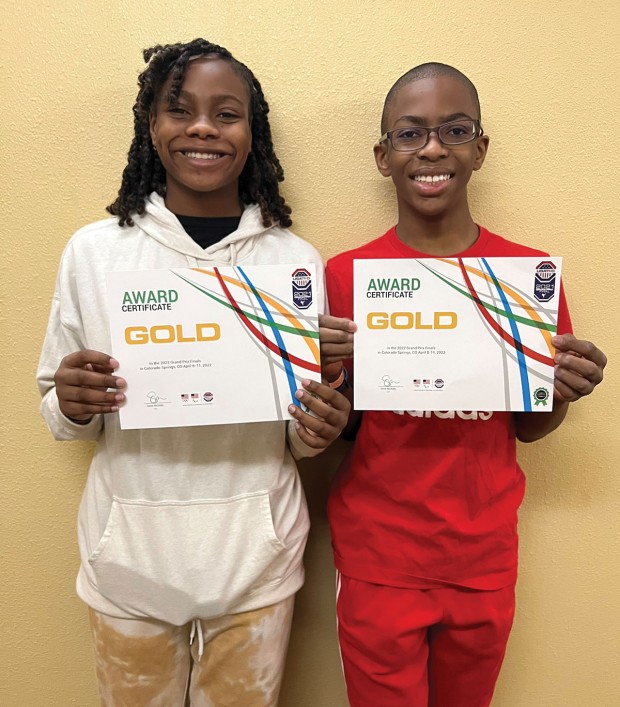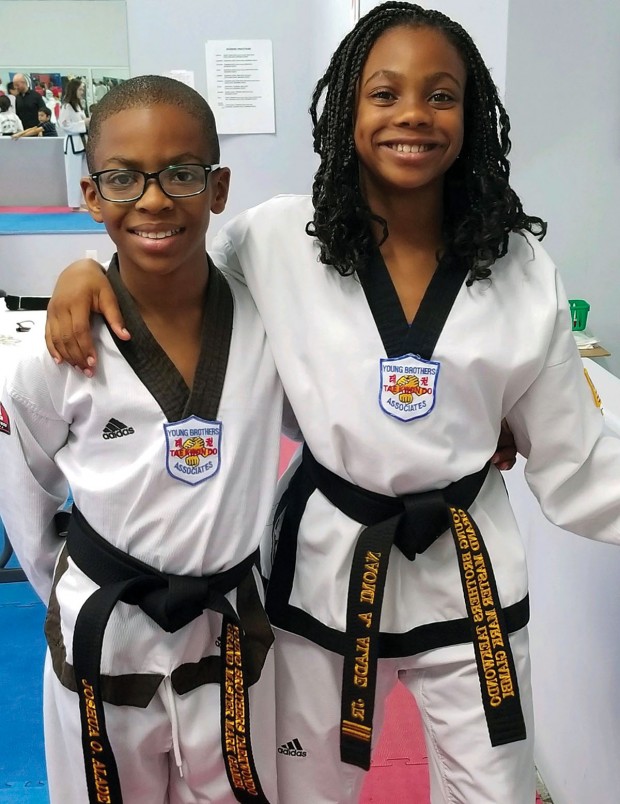In It to Win It
World-class taekwondo athletes

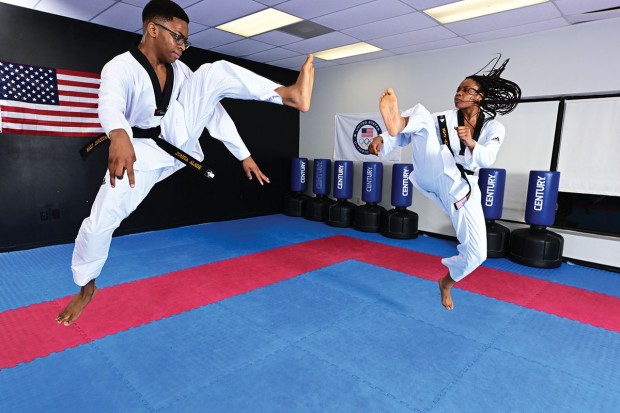
SWIFT KICKS Top: Joshua and Naomi demonstrate some kicks. (Photo: jackophoto.com)
Maybe you did taekwondo, the Korean martial art, as a child. Maybe you put your own kids into taekwondo classes. After all, it’s a great activity: it’s physical exercise, it’s a mental challenge, it teaches discipline and coordination, it burns off energy, and it’s fun.
And maybe you remember the rows of students, arranged by belt color, in their dobocks (uniforms), practicing their patterns. At a certain level of proficiency, they get to spar. If they stick with it, they get to test periodically to show their skills and knowledge and move up in belt colors.
But that’s just one part of taekwondo.
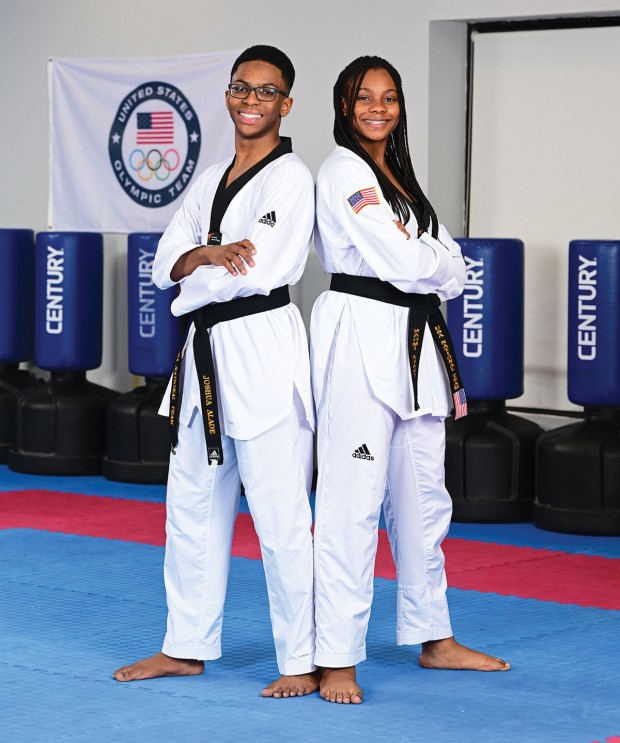
BY DEGREES Siblings Joshua and Naomi Alade are among the best taekwondo athletes in the world. The tenth graders at Carnegie Vanguard (Joshua skipped a grade) are both members of Team USA, the team that represents the United States in international sports competitions. (Photo: jackophoto.com)
“There are two different worlds of taekwondo,” explains Master Gianni Giambi of the Houston Center for Taekwondo. (The title of “Master” denotes that Gianni has attained the level of fourth-degree black belt or higher.) “The traditional world is where you learn the art of taekwondo; it’s where everyone starts.”
Then, there’s the sport of taekwondo, where athletes compete at sparring. You can compete locally, in your state, nationally, internationally, or even, since 2000, at the Olympics. At the international level, all the competitors are black belts.
Two members of the Houston Center for Taekwondo’s G-Force team, 16-year-old Naomi Alade and her 15-year-old brother Joshua, have attained the upper levels of their sport internationally and are eyeing the Olympics.
Their parents, Oladapo “Dap” and Kiyetta Alade, started their two oldest children in taekwondo when Joshua was three and Naomi was four. “Like a lot of folks, we started them in it because it was a good after-school activity, it was exercise, it developed their coordination, it worked off their energy,” says Dap.
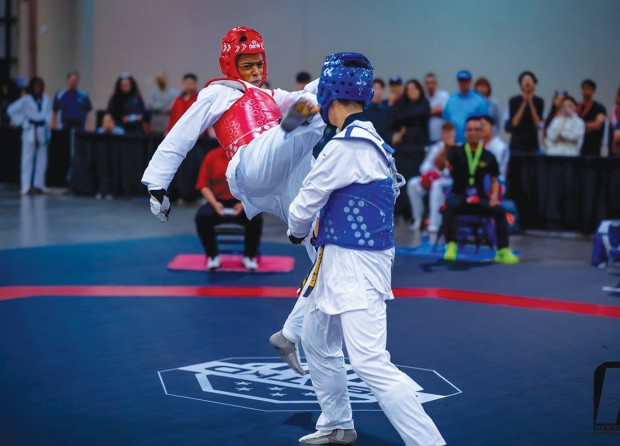
Joshua and Naomi in their final matches when they both won gold at the National Championships in Jacksonville, Fla. in July 2023. (Photo: Kyle Newsome)
They started at Young Brothers Taekwondo, Gianni’s father’s school. Mark Giambi is a Grand Master or ninth-degree black belt. It was Mark who brought up the possibility of Naomi and Joshua moving to Gianni’s dojang (school) to train on a competitive team. “He kept saying, ‘I’m telling you: they’re really good,’” remembers Dap.
At first, the Alades weren’t sure they wanted to do that. “I mean, I could see they were a little more coordinated than the other kids, but they were only five and six,” says Dap. The Giambis convinced the Alades to allow Naomi and Joshua to compete at one event, which they both won. The Alades decided to try the classes at the Houston Center to see if Naomi and Joshua liked them.
“Well, they loved them,” says Dap.
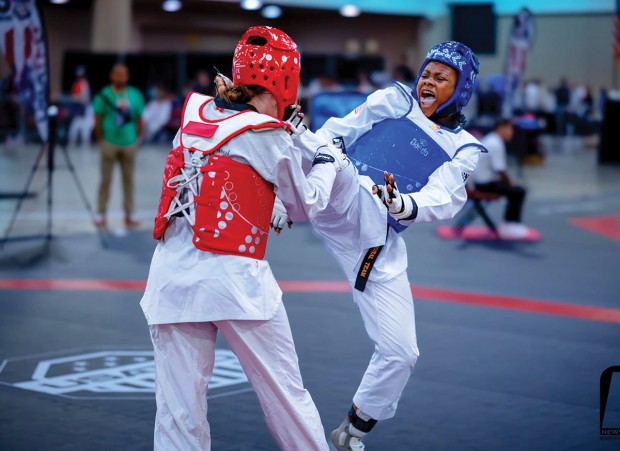
Joshua and Naomi in their final matches when they both won gold at the National Championships in Jacksonville, Fla. in July 2023. (Photo: Kyle Newsome)
These days, the two Carnegie Vanguard tenth graders (Joshua skipped a grade) are among the most highly ranked taekwondo athletes in the world. Both are members of Team USA, the team that represents the United States in international sports competitions, Naomi since 2019 and Joshua since 2022. Joshua is currently in the junior division (ages 15-17). Naomi is allowed by the sport’s rules to compete in both the junior and the senior (ages 18-32) divisions for a time. In fact, just this past February, she competed for the first time in the senior division at an international competition, the Canada Open in Vancouver, and won the gold in her weight class. Although she is competing (and more often than not, winning) against the best women taekwondo athletes in the world, when it comes to qualifying for this year’s Olympics, she is just a hair’s breadth too young: Taekwondo athletes have to turn 17 years old by August to compete at the 2024 Summer Olympics in Paris. Naomi turns 17 in December.
Her coach, Gianni, sees a positive in this: “She will be an experienced, seasoned veteran for 2028,” he declares.
Competitive taekwondo is not as big a sport in the U.S. (yet) as it is in other parts of the world. “In this sport, if you are an aspiring Olympian in the U.S., you have to travel,” says Dap. “And when you first do, even though you were dominating the national competitions in the U.S., you’ll get your eyes opened when you’re in Europe and Asia.” The level of competition internationally is so much higher. In a tournament, athletes compete in one-on-one matches. As long as they are winning (the competitions are single elimination), they might compete in three or four matches in a day. Each match is three rounds. Each round is 90 seconds (for the junior division) or two minutes (for the senior). “And that feels like a long time when you’re facing someone who is trying to kick you, particularly in the head, as hard as they can,” says Dap, who competed a little bit at the local level himself both as a kid and again as an adult when Naomi and Joshua started doing it.
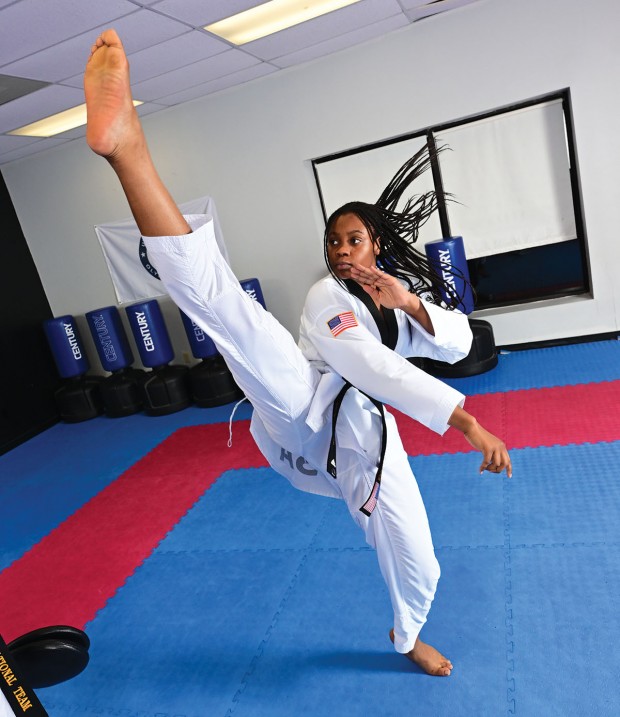
KICKING IT Naomi and Joshua demonstrate the power and grace of taekwondo kicks. (Photo: jackophoto.com)
Although taekwondo competitors do punch each other, the focus is really on kicking. They wear a padded helmet, a torso protector, shin and forearm guards as well as sensing socks and gloves when competing.
As in fencing, taekwondo equipment is wired with sensors that record when a kick or punch connects with the opponent and with what force. Judges also watch. As in boxing, a taekwondo fighter can win by knockout, either actually knocking their opponent down or just stunning them so much that they can’t continue to fight after the referee gives them an eight-count. Otherwise, a fighter wins a round by earning more points than his or her opponent. A punch to the torso is worth one point. (No punches to the head are allowed). A kick to the head receives more points (three) than a kick to the torso (two), and a spinning or rotating kick, where the fighter spins in the air before landing the blow, earns more points (four points if to the trunk and five if to the head). Generally, whoever wins two out of three rounds wins the match.
Taekwondo is also strategic. For example, when two fighters face off against each other, they start bouncing on their toes. This is to be ready to kick quickly, but it also hides what kind of kick they might be planning. “Human beings try to sense patterns,” explains Dap. Taekwondo fighters try to lull their opponents into thinking they know what’s coming next, so they can land a kick their opponent didn’t expect.
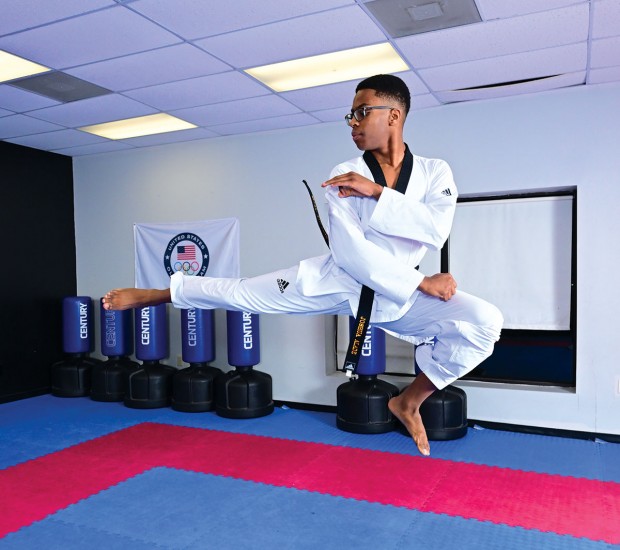
KICKING IT Naomi and Joshua demonstrate the power and grace of taekwondo kicks. (Photo: jackophoto.com)
What is it like to be an elite taekwondo athlete? Naomi and Joshua practice four to five times a week, usually after school, year-round.
“To be really good, you have to put in the work,” says Joshua. “You have to work hard to get where you want to be.”
“It is a microcosm of how life works,” agrees his dad. “It’s about discipline and dedication. You do what you need to do.”
And now that they are competing internationally, they travel – a lot. “We try to keep it to two competitions a month,” says Dap. “And at first, that was very daunting, a whirlwind.” He and Kiyetta have settled into taking turns traveling to competitions with Naomi and Joshua. Recently, Kiyetta went to Vancouver with Naomi, then the following weekend, Dap went with Naomi and Joshua to Reno, Nevada. Gianni also goes with them. A taekwondo athlete is required to have a coach, preferably their coach, in their corner at competitions. The entire Alade family, including 10-year-old Faith and 9-year-old twins, Elijah and Isaiah, made a vacation out of a recent competition in Costa Rica. Joshua and Naomi have been to Turkey, Uzbekistan, Bosnia, Bulgaria, the Netherlands, Belgium, and Mexico to compete. Future trips on the books include Brazil and Korea.
“The kids enjoy the travel. They’ve got a lot of cool stamps in their passports,” says Dap. “We’ve been to places we might not ever have gone but they were pretty cool.” They were in Bulgaria for almost two weeks for a competition and Uzbekistan for almost a week. Naomi and Joshua especially liked Uzbekistan, where the event’s organizers arranged tours for the athletes and their families with local college students as their guides.
Gianni points out that at such elite levels, “Parental involvement and investment is so important. It’s a gigantic advantage.” The Alades do a great job, Gianni says, in a role where it can be hard for parents, caught up in the excitement, to be a positive force and not a negative one for their children. Gianni remembers a study where researchers asked elite athletes what the worst part of their experience was growing up in their sport. “Ninety percent of them said it was the drive home with their parents,” he says. In another study, a researcher pointed out that the parents of athletes have “a great potential for positivity,” but also, even though well-intentioned, parents can “be a considerable negative influence.”
“Parents don’t always realize how perceptive their kids are of them,” says Gianni. “That raised eyebrow. Those crossed arms.”
Dap doesn’t believe in forcing a child to do a sport. The youngest three Alades tried taekwondo and decided it wasn’t for them. (They play soccer.)
Naomi and Joshua are close and are each other’s biggest supporters. The siblings spend a lot of time together: at school, at the dojang, on their travels. They cheer each other on at competitions. And when asked, “Who is your biggest inspiration?” for their profiles on the Team USA website, Naomi replied, “My younger brother, Joshua,” and Joshua answered, “My big sister, Naomi.”

Pictured (top, from left) Dap, Naomi, Joshua, Kiyetta; (bottom, from left) Isaiah, Faith, and Elijah. Joshua was both the youngest member of the class and its valedictorian.
“You do need a certain mindset to do a combat sport, to go into fights where someone’s going to kick you in the face and in the body as hard as they can over and over again,” says Dap.
Both Naomi and Joshua are serious students. They both want to be doctors like their parents. They say juggling all the things they want to do, and do well, is all about time management.
And Naomi and Joshua thrive on the challenge and the competition of their sport.
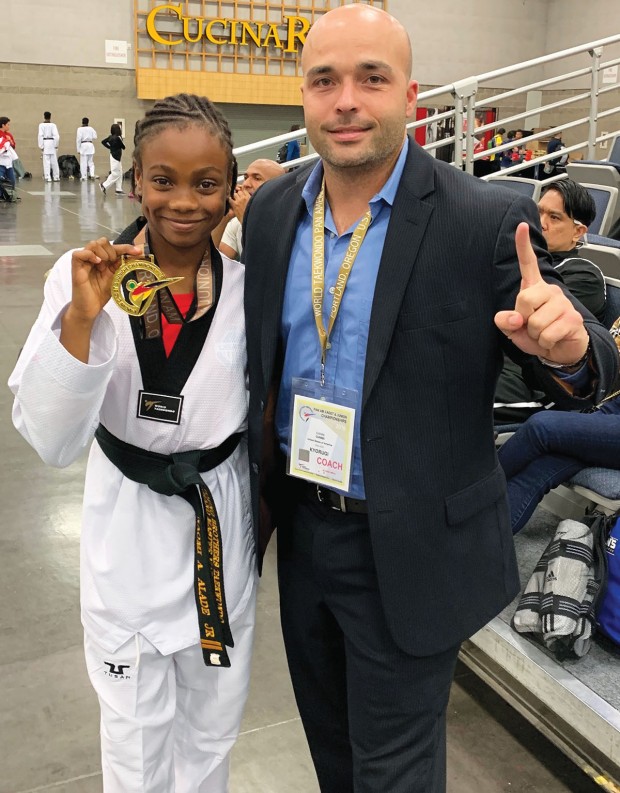
Naomi with Coach Gianni Giambi when Naomi won at the Pan American Championship in 2019; and the Alade family at Naomi and Joshua's eighth-grade graduation from Veritas Christian Academy in 2022.
“I like it because I’m good at it,” says Joshua with a quiet smile.
“It does feel pretty good to be up on that podium,” agrees Naomi with a grin.
Want more buzz like this? Sign up for our Morning Buzz emails.
To leave a comment, please log in or create an account with The Buzz Magazines, Disqus, Facebook, or Twitter. Or you may post as a guest.


